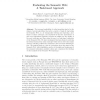366 search results - page 59 / 74 » Subjectivity Word Sense Disambiguation |
LREC
2010
13 years 9 months ago
2010
Lexical substitution is the task of finding a replacement for a target word in a sentence so as to preserve, as closely as possible, the meaning of the original sentence. It has b...
EMNLP
2008
13 years 9 months ago
2008
Human linguistic annotation is crucial for many natural language processing tasks but can be expensive and time-consuming. We explore the use of Amazon's Mechanical Turk syst...
SEMWEB
2007
Springer
14 years 1 months ago
2007
Springer
The increased availability of online knowledge has led to the design of several algorithms that solve a variety of tasks by harvesting the Semantic Web, i.e., by dynamically select...
EWMF
2005
Springer
14 years 1 months ago
2005
Springer
Web personalization is the process of customizing a web site to the needs of each specific user or set of users. Personalization of a web site may be performed by the provision of ...
LREC
2010
13 years 9 months ago
2010
In the paper we investigate the impact of data size on a Word Sense Disambiguation task (WSD). We question the assumption that the knowledge acquisition bottleneck, which is known...

